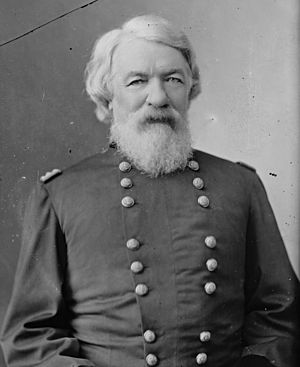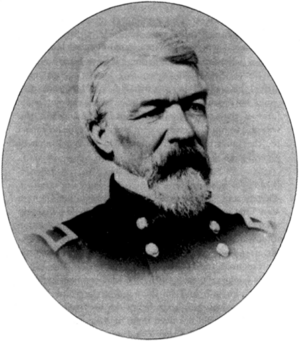Stewart Van Vliet facts for kids
Quick facts for kids
Stewart Van Vliet
|
|
|---|---|

Stewart Van Vliet
|
|
| Born | July 21, 1815 Ferrisburg, Vermont |
| Died | March 28, 1901 (aged 85) Washington, D.C. |
| Buried | |
| Allegiance | United States of America Union |
| Service/ |
United States Army Union Army |
| Years of service | 1840–1881 |
| Rank | |
| Battles/wars | |
| Spouse(s) | Sarah Jane Brown |
| Children | Robert Campbell Van Vliet |
Stewart Leonard Van Vliet (born July 21, 1815 – died March 28, 1901) was an important officer in the United States Army. He served during many conflicts, including the American Civil War, where he fought for the Union side.
Contents
Early Life and Military Training
Stewart Van Vliet was born in Ferrisburg, Vermont. His parents were Rachel Hough and Christian Van Vliet. He grew up and went to school in Fishkill, New York.
In 1836, he joined the United States Military Academy (often called West Point). This is a famous school where people train to become army officers. He graduated in 1840, ranking 9th out of 42 students. Many of his classmates also became important generals during the Civil War, like William Tecumseh Sherman and George Henry Thomas.
First Battles
After West Point, Van Vliet joined the U.S. 3rd Artillery. He fought in the Seminole Wars in Florida, where he bravely took part in several battles.
Later, he served in the Mexican–American War. He fought alongside famous generals like Zachary Taylor at the Battle of Monterrey. He also served under General Winfield Scott during the Siege of Veracruz.
After this war, he was sent to Kansas. There, he helped build forts along the Platte River. These forts were important for protecting settlers and travelers.
Adventures in the West
On March 6, 1851, Van Vliet married Sarah Jane Brown at Fort Laramie. Her father was Major Jacob Brown.
In 1855, he was part of the Sioux Expedition. Two years later, in 1857, he joined Colonel Albert Sidney Johnston in the Utah War. This conflict was against the Mormons, who were in disagreement with the United States government.
Van Vliet had a very interesting role in the Utah War. He was asked to go ahead of the army and talk with Brigham Young, the leader of the Mormons. He traveled very quickly, covering a thousand miles from Leavenworth to Salt Lake City in light wagons with 30 soldiers.
As he got closer to Utah, other travelers warned him that the Mormons might harm him. He took these warnings seriously. To protect his soldiers, he left them 150 miles from Salt Lake City. Then, he rode into the Mormon stronghold all by himself. He was treated kindly, and because of his efforts, the conflict was settled peacefully without any fighting.
Civil War Service
When the Civil War began, Stewart Van Vliet was promoted to major on August 3, 1861. Soon after, on September 23, 1861, he became a Brigadier General in the volunteer army.
During the war, he was the chief quartermaster for the Army of the Potomac. This meant he was in charge of getting all the supplies, food, and equipment for this large army. He held this important job from August 1861 to July 1862.
After his time with the Army of the Potomac, he was stationed in New York City. For the rest of the war, he continued to coordinate supplies and transportation for all the Union troops. In October 1864, he received special promotions, known as brevet promotions, to lieutenant colonel, colonel, and brigadier general in the U.S. Army. He also became a brevet major general in both the U.S. Army and the volunteers. He was promoted again to Brigadier General, Volunteers, on March 13, 1865.
Later Life and Retirement
After the Civil War ended, General Van Vliet stayed in the Regular Army. He served until 1881. When he retired, he was the Assistant Quartermaster General of the U.S. Army. His last job was on the Retiring Board, which he started in 1879.
He continued to live in Washington, D.C., after he retired. He passed away there on March 28, 1901. He is buried at Arlington National Cemetery, a famous cemetery for military heroes.
General Van Vliet was also a member of several important groups, including the Aztec Club, the Holland Society, the St. Nicholas Society, the Loyal Legion, and the Grand Army of the Republic. These groups were often made up of military veterans or people with shared heritage.
 | Delilah Pierce |
 | Gordon Parks |
 | Augusta Savage |
 | Charles Ethan Porter |


